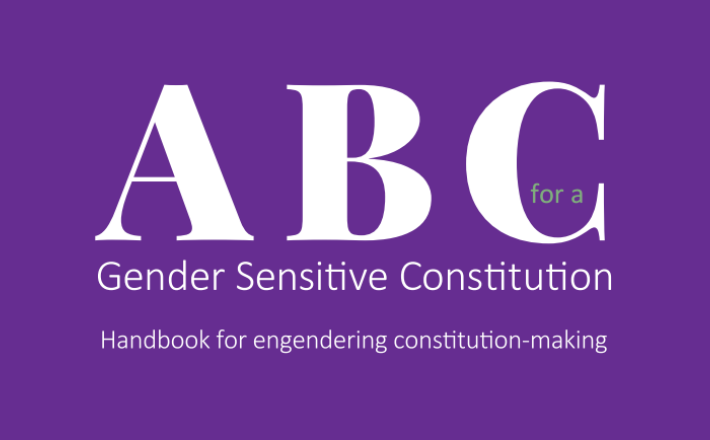ABC for a Gender Sensitive Constitution: Hanbdook for engendering constitution-making
During political transitions it is important to put emphasis on women’s rights and gender equality in order to take the opportunity to correct the historical exclusion of women from the political sphere. Thus, a reform process towards democracy can only be successful if human rights for both women and men are considered and respected. In this regard constitutions are of crucial importance. They structure power arrangements, recognize individual rights and freedoms, and provide the basis for the judicial protection against abuses of power and rights violations. Enshrining women’s rights, gender equality, and the principle of non-discrimination based on gender in constitutions recognizes women’s equal status and enables legislative changes addressing existing discrimination. Constitution building is a fight, from the early phases of preparation, throughout drafting and ratification, and continuing during implementation.
The guide ABC for a Gender Sensitive Constitution is the result of a fruitful collaboration between the Euromed Feminist Initiative IFE-EFI, researchers and activists from Syria, Europe and the Maghreb. The ABC for a Gender Sensitive Constitution aims to provide a feminist perspective on democratic constitution making in a systematic and accessible way. It answers the questions of how and why a constitution that is inclusive of women’s rights and gender equality is needed. What are the entry points? How to debate them? The handbook combines academic research and constitutional expertise with a feminist theoretic approach, substantiated by the experiences of the women’s rights activists in the Euromed region and examples from different constitutions and processes across the world. This ABC does not only support future constitution building in transitional political processes and post-conflict situations, but also strives to inspire a critical review of existing constitutions, many of which still lack a genuine commitment to women’s rights and gender equality. Click here to access the handbook.

During political transitions it is important to put emphasis on women’s rights and gender equality in order to take the opportunity to correct the historical exclusion of women from the political sphere. Thus, a reform process towards democracy can only be successful if human rights for both women and men are considered and respected. In this regard constitutions are of crucial importance. They structure power arrangements, recognize individual rights and freedoms, and provide the basis for the judicial protection against abuses of power and rights violations. Enshrining women’s rights, gender equality, and the principle of non-discrimination based on gender in constitutions recognizes women’s equal status and enables legislative changes addressing existing discrimination. Constitution building is a fight, from the early phases of preparation, throughout drafting and ratification, and continuing during implementation.
The guide ABC for a Gender Sensitive Constitution is the result of a fruitful collaboration between the Euromed Feminist Initiative IFE-EFI, researchers and activists from Syria, Europe and the Maghreb. The ABC for a Gender Sensitive Constitution aims to provide a feminist perspective on democratic constitution making in a systematic and accessible way. It answers the questions of how and why a constitution that is inclusive of women’s rights and gender equality is needed. What are the entry points? How to debate them? The handbook combines academic research and constitutional expertise with a feminist theoretic approach, substantiated by the experiences of the women’s rights activists in the Euromed region and examples from different constitutions and processes across the world. This ABC does not only support future constitution building in transitional political processes and post-conflict situations, but also strives to inspire a critical review of existing constitutions, many of which still lack a genuine commitment to women’s rights and gender equality. Click here to access the handbook.